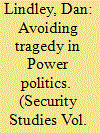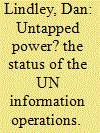| Srl | Item |
| 1 |
ID:
061064


|
|
|
|
|
| Publication |
Winter 2003-04.
|
|
|
|
|
|
|
|
|
|
|
|
|
|
|
|
| 2 |
ID:
072891


|
|
|
|
|
| Publication |
2006.
|
| Summary/Abstract |
Few arms control scholars or practitioners are familiar with the Open Skies Treaty and other cooperative airborne monitoring programmes. Yet the Treaty only began full-scale implementation on 1 January 2006. All NATO members and much of the former Warsaw Pact region are subject to overflights. According to the quotas specified by the treaty, Russia and the United States each are subject to up to 42 annual confidence-building overflights annually by planes equipped with cameras and other sensors, though there will be only four overflights in 2006. Other parties to the treaty have smaller overflight quotas. This is progress, but there are a host of new applications for airborne monitoring regimes that have barely been explored. This article summarizes the history and current status of Open Skies, indicating its strengths but also highlighting its weaknesses. It recommends future uses for cooperative airborne monitoring. Open Skies regimes can be an effective tool in many conflict areas including India-Pakistan and the Horn of Africa. They also have enormous potential for surveying the environment, verifying environmental agreements, evaluating degradation, and natural disaster assessment.
|
|
|
|
|
|
|
|
|
|
|
|
|
|
|
|
| 3 |
ID:
077538


|
|
|
|
|
| Publication |
2007.
|
| Summary/Abstract |
This article surveys the history of Cyprus's conflict and partition to derive historical, tactical, and strategic lessons about how the Cyprus problem should be resolved and about the value of partitions more generally. Cyprus is complex. Tensions between North and South are very low, in part because the partition has been a cause of peace. However, both sides remain pervaded by antagonistic and one-sided biases, histories, and myths. Moreover, almost every plausible solution, including the Annan Plan, that proposes to unite the island also incorporates the group-based and gridlock-prone characteristics of the conflict-generating 1960 constitution. A Cyprus solution solves little and creates risks. A better plan to create a permanent peace is to recognize a much smaller North, and bring all sides including Turkey into the European Union. This would create peace, give most Greek Cypriot refugees their land and homes back, and restore all freedoms throughout the island
|
|
|
|
|
|
|
|
|
|
|
|
|
|
|
|
| 4 |
ID:
051968


|
|
|
| 5 |
ID:
057774


|
|
|